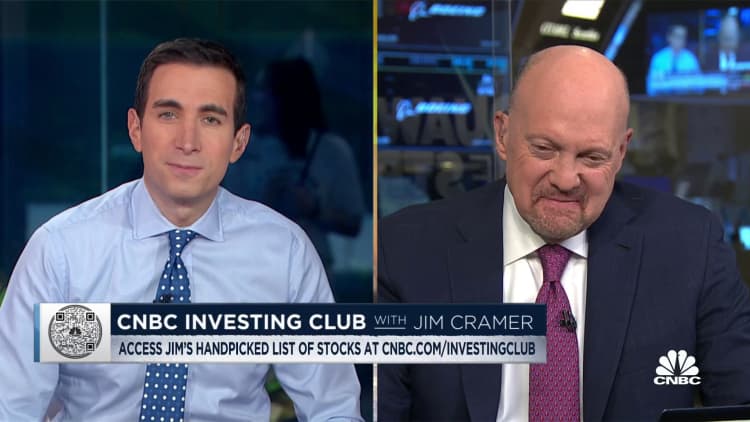After the recent earnings from big technology companies and the mounting layoff headlines in the sector, tech investors can be excused for feeling a little confused: Is the tech-led economy about to fall off a recessionary cliff?
Stocks like Amazon.com and Microsoft got pounded after missing analysts' growth forecast for their cloud computing businesses, which rely on corporations' demand for technology and innovation. They are also among the tech giants announcing hiring freezes and job cuts. The path of tech demand has been one of the key questions as markets try to handicap the odds of a 2023 recession. But the latest report on third-quarter gross domestic product had investment in equipment and intellectual property rising–including tech hardware and software.
Experts say the likely conclusion is that tech demand keeps growing — and that companies across the economy will continue to see technology change the nature of their businesses and workers see technology change their jobs. Whether that offsets weakness elsewhere in the economy is another question. Amazon said in its third-quarter analyst call that weakness in industries such as banking and cryptocurrency is translating into lower demand, as the Covid pandemic bump in demand from companies and workers adjusting to remote work has slowed.
"CEOs and CFOs have no intention of cutting tech spending," said Gartner chief forecaster John-David Lovelock. "Chief information officers are still wearing their halo from 2020, and CEOs are going back to the people who gave them the last set of solutions.''
On the bright side, the GDP report painted a picture of fairly strong technology demand, said Bank of America Merrill Lynch economist Michael Gapen. The shortfall in investment spending was driven by a sharp decline in residential investment, he said.
"The surprise, if anything, was that equipment spending was stronger'' than expected, Gapen said. "Investment in that category is going to be persistent. If we have a risk, it's that this grows at a slower rate. It would take a severe recession for this to decline."
Demand has stayed strong for both hardware and software. For intellectual property, investment fell 3.6% in 2009 but has risen an average of 10 percent annually in 2021 and 2022, Gapen noted.
Tech spending overall will rise about 5.1% next year after a gain of less than 1 percent this year, according to a new survey by Gartner, which is nearly unchanged from surveys earlier this year, and reflects executives' knowledge that companies that cut investment during the 2008 financial crisis badly lagged competitors in years that followed, Lovelock said.
"Data has come in right around our forecast, except for consumer devices, which have been a little lower," Lovelock said. Both semiconductors and consumer devices are working off a situation where heavy demand in 2020 cannot be sustained, after workers bolstered their home offices, resulting in households having relatively new gear on hand with few compelling new applications to spur upgrades, he said.
Growth in cloud computing, the highest-profile category of technology investment in recent years, has slowed only a small amount and was destined to come down from its initial hyper growth stage, Lovelock said. Gartner expects cloud computing revenues to rise $101 billion next year — more than the $90 billion in 2021, but representing a smaller percentage of growth. In percentage terms, cloud spending will rise by about 20 percent for the next two to three years, according to Gartner's forecast.
"If Microsoft (cloud services business) was growing 50 percent and now it's 35, it's hard to say that's bad news," he said.

Microsoft acknowledged that some customers are trimming budgets, resulting in revenue forecasts for the coming quarter that disappointed the markets, but said demand for their faster-growing services should be helped by cost pressures. That's because cloud computing is usually cheaper than solutions it replaces. Amazon added that it can move some clients to cheaper versions of its cloud services that use less expensive chips, for example.
"As a CFO, I appreciate that, and we're doing the same thing here at Amazon," Amazon chief financial officer Brian Olsavsky said after its earnings.
The problems of enterprise technology companies are very different than those that depend mostly on consumer spending, like Apple, or on advertising spending, like Meta Platforms, parent of Facebook. Apple, which beat quarterly projections for the September quarter, has seen its stock fare better than peers, though it warned over the weekend that China's Zero Covid policy and outbreaks at Foxconn are going to significantly impact new iPhone production. Facebook, hampered by big early losses on its metaverse investment that Evercore ISI analyst Mark Mahaney says may shave $5 a share from 2024 earnings and declining engagement with its core social media platforms, saw shares tank after its third-quarter report and is now reportedly getting ready to announce major layoffs.
Overall, tech industry profits will grow about 2 percent this year, rebounding to 6 percent growth in 2023, CFRA Research estimates.
That will reflect a split between rising sectors like cloud computing and legacy producers, many of them in software, that are scrambling to keep customers who are shifting toward web-based products, said CFRA tech analyst John Freeman. Before this year, cloud revenues were still about 40 percent of those in enterprise software, he said, suggesting that there is room for much more change in the industry – and in the experience of non-tech workers who will shift to new ways of working.
"Nothing has changed in the fundamental technology outlook," Freeman said. "It has improved, actually. Once macro risks are eventually settled into, people will go forward because companies have to become more agile. This [slowdown] is going to be much more painful for those with a reliance on legacy software."
The continuing shift in technology spending toward internet-based technology will mean challenges for companies that are moving to the cloud as fast as they can, Freeman said.
Oracle, for example, gets more than 30 percent of revenue from cloud products, and executives said in September that the company's growth will accelerate as it becomes more cloud-focused. Microsoft will juggle the impact of its fast-growing cloud businesses and other businesses, such as LinkedIn and the Bing internet browser, and a measured decline in its legacy Windows business, Freeman said. Other legacy software players, as in the recently completed merger of Tibco Software and Citrix Systems, may go private and work out their transitions away from the glare of public markets, he said.
But for companies spending on tech and their workers, the pace of change is unlikely to slow, Lovelock said.
"The pace of change will never be this slow again," he said.






